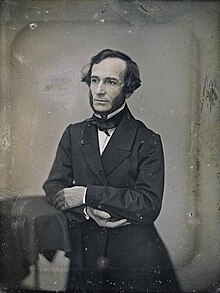Juan Bautista Alberdi

Alberdi's daguerreotype taken in Chile, dated between 1850 and 1853.
|
|
| Born |
August 29, 1810 San Miguel de Tucumán, Argentina |
| Died | June 19, 1884 (aged 73) Neuilly-sur-Seine, France |
| Resting place | House of government of Tucumán |
| Language | Spanish |
| Nationality | Argentine |
| Notable works | Bases y puntos de partida para la organización política de la República Argentina |
Juan Bautista Alberdi (August 29, 1810 – June 19, 1884) was an Argentine political theorist and diplomat. Although he lived most of his life in exile in Montevideo, Uruguay and in Chile, he influenced the content of the Constitution of Argentina of 1853.
Juan Bautista Alberdi was born in San Miguel de Tucumán, capital city of the Tucumán Province, Argentina, on August 29, 1810. His father, Salvador Alberdi, was a Spanish Basque merchant; his mother, Josefa Aráoz y Balderrama, had been born into an Argentine family of Spanish descent. She died as a result of Juan Bautista's birth. Salvador Alberdi supported the patriots during the Argentine War of Independence, and had interviews with general Manuel Belgrano during the Second Upper Peru campaign that was fought in Tucumán and northern areas in 1812 and 1813. His father died as well in 1822; as he was still a minor his siblings Felipe and Tránsita became his legal guardians.
He got a scholarship to the School of Moral sciences in Buenos Aires, along fellow Tucuman Marco Avellaneda. He studied alongside Vicente Fidel López and Esteban Echeverría. He could not endure the harsh discipline of the school, and briefly left his studies pretexting being sick. He became interested in music, but preferred to learn it through autodidacticism rather than through formal artistic education. He wrote his first book in 1832, El espíritu de la música (Spanish: The spirit of music). He got a job with Juan Maldes, a friend of his family, and continued the informal learning of his other studies. He resumed his formal studies in 1831, and moved to the University of Córdoba. He returned to his province for family business, and wrote Memoria descriptiva sobre Tucumán (Spanish: Descriptive report of Tucumán) at the request of governor Alejandro Heredia. He declined the governor's request to stay in Tucumán, and returned to Buenos Aires.
...
Wikipedia
